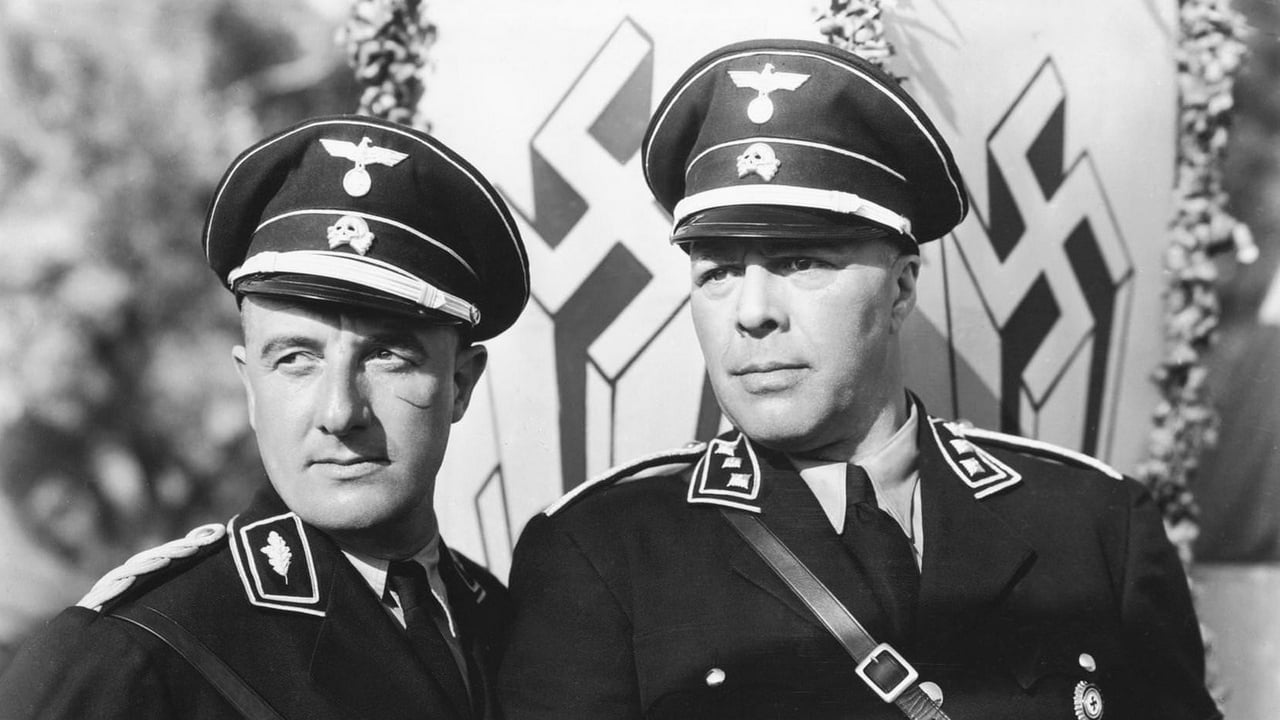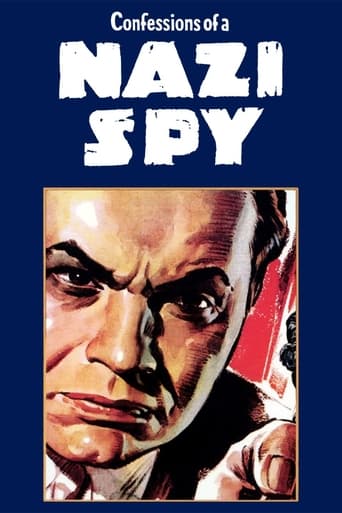

Hollywood produced this one as the war in Europe had barely begun and the US was a couple of years away from Pearl Harbor. They had correctly identified the threat from Nazi Germany, though, and made a pretty accurate assessment of the consequences involved. "Confessions Of A Nazi Spy" is better than it sounds, and is not a story extracted from a cheap novel.Nutshell; Some German-Americans felt an attachment to their Fatherland at the outbreak of the war, and some bought into the narrative and became Nazi sympathizers. Schneider (Francis Lederer) is one of those. He is inspired by the speeches of Dr. Kassell (Paul Lukas) and becomes a spy - more of a messenger - for a local subversive Nazi group. He is discovered by the FBI (Edw. G. Robinson), loses his nerve and informs on the group. Any more of the plot will spoil the story.The picture is related in semi-documentary style which gives it a patina of authenticity and is directed by Hollywood veteran Anatole Litvak, who adds the required tension and who made several noteworthy noir and crime dramas in his career. Lederer and Lukas supply the villains and Robinson the hero in this surprisingly good rendition of a story of troublesome times to come for America.
... View Morebut if you watch this expecting Edward G. Robinson to be front and center during most of the film you will be disappointed. Robinson doesn't show up until two-thirds of the way into the movie, and even then he is not the center of attention. He is just the biggest star in this film as an F.B.I. agent trying to break up a Nazi spy ring in America.Some people try to compare this film with the propaganda films of the HUAC era of the early 1950's, but there is one big difference - many of the incidents mentioned here are based on actual cases, and the Nazis did actually declare war on the U.S. In fact, American indifference to the growing Nazi menace in the late 1930's might have been the cause for the overreaction and Communist witch hunts of the early 1950's. Ironically, Edward G. Robinson himself was an object of those witch hunts.With few well known stars, this film manages to spin an interesting and rather complex tale of Nazis in 1930's America, their strategy, and their individual weaknesses. In the case of Paul Lukas' Dr. Kassel, part of his problem is he wants to impress a young lady with whom he is involved. Being a Nazi leader makes him important in her eyes. In the case of Francis Lederer's Kurt Schneider, he thinks he is too important and too smart to be bogged down in the every day routine of making a living, although it is ironic that accumulating capital seems to be his central goal.It's true that this film goes over the top at times, but it is still a fine example of film-making in that golden year of Hollywood, 1939. Highly recommended.
... View MoreThis is a footnote, really, but one wonders why the film makers kept putting their actors on the SS Bismarck for their frequent trips between the USA and Germany. That beautiful liner, the biggest in the world at the time, was built by the Germans during the first world war, and handed over to the British in war reparations afterwards. She last sailed as the Bismarck in 1922, and after that sailed for the White Star Line as their flagship SS Majestic, ending her days during the second world war as the Royal Navy training ship, HMS Caledonia. She caught fire and sank at her moorings in 1940.So, at the time this film took place, there was no SS Bismarck, but there was HMS Caledonia.
... View MoreThis is a fast-paced, sometimes slightly confusing but never boring semi-documentary- style FBI drama about the hunt for a ring of Nazi spies in the US in the years leading up to World War Two. The nastiest Nazis are played by such villainous actors as George Sanders, Martin Kosleck and Hans von Twardowski; somewhat softer but still powerful characterizations are supplied by Frances Lederer as a misfit with dreams of grandeur and Paul Lukas as a cultivated and respected doctor who lectures at gatherings of the German- American Bund. They are all scheming to steal military secrets for the use of the Third Reich in its ambitions to conquer America. Edward G. Robinson plays the FBI official who tracks them down. If you are familiar with later movies like House on 92nd Street, Double Indemnity, Hangmen Also Die, They Drive By Night, The Stranger and Man Hunt you will see that all of these actors were past masters of the types of roles they played therein. Based on a true story of a spy ring in the Yorkville section of Manhattan, these frightening individuals are brought to compelling life under the no-nonsense direction of Anatole Litvak. Although the film can certainly be described as propagandistic, particularly with the bombastic Walter Winchellesque narration, who can argue that something sinister wasn't afoot in those days and that America wasn't directly threatened by a powerful and totalitarian rival? Sure, America was not perfect either, but it is easy to be roused by the spirit of independence and individual liberty that is evoked by the good guys trapping and defeating the bad guys. One of the best scenes is the interrogation of Frances Lederer by the seasoned FBI agent Robinson who cleverly yet forcefully appeals to Lederer's vanity to coax him into confessing and naming names. Paul Lukas is also gripping as the suave and confident doctor who by degrees crumbles in defeat after first being cornered by the FBI and then set upon by the Gestapo. Unfortunately the fate of some of the spies is not resolved at the end and the narrative just seems to drop them in favor of a blitzkrieg of wartime propaganda (much of it added after the film's initial release to update it for 1940 audiences). According to the FBI historian who appeared on Turner Classic Movies to introduce and discuss the film, this anti- espionage effort was largely a failure but the FBI learned a great deal from it and got better at its job in ensuing years. Part documentary, part detective story, part human drama, part cat-and-mouse chase adventure. Something for everyone.
... View More